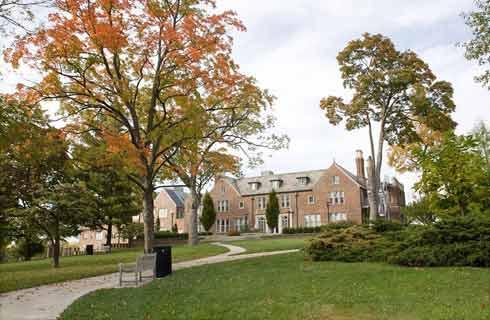神经影像:方法与应用(理学硕士)
Neuroimaging: Methods and Applications (MSc)

学历文凭
Masters Degree (Taught)

专业院系

开学时间

课程时长

课程学费

国际学生入学条件
Acceptable subjects include Biology, Engineering, Mathematics, Neuroscience, Physics, and Psychology.
Other essential requirements:
You will also need to provide:
two references, one of which should be an academic reference. If you are a current Cardiff University student, you are not required to supply references.
a personal statement of no more than 500 words which answers the five questions below.
Why would you like to study the MSc Neuroimaging: Methods & Applications?
Why would you like to do this at Cardiff University, in CUBRIC?
Which aspect of our Neuroimaging course interests you most and why?
Please discuss a research finding that used neuroimaging which you found interesting.
How will completion of this Neuroimaging course help you to achieve your career goals?
Overseas students with equivalent degree classifications, where English is not their first language, must provide proof of proficiency in the English language IELTS 7 or above overall and a minimum of 6 in each of the sub-scores.
TOEFL (iBT) - At least 100 with minimum scores of 24 for writing, 22 for listening, 24 for reading and 25 for speaking
International Baccalaureate (Language A) - HL 5 or SL 6
IDP—雅思考试联合主办方

雅思考试总分
7.0
- 雅思总分:7
- 托福网考总分:100
- 托福笔试总分:160
- 其他语言考试:Pearson Test of English - 70 with no less than 54 in all skills
CRICOS代码:
申请截止日期: 请与IDP联系 以获取详细信息。
课程简介
On this course you will be introduced to a wide range of neuroimaging and stimulation methods, including: structural and functional Magnetic Resonance Imaging (MRI), Magnetoencephalography (MEG), Electroencephalography (EEG), Transcranial Magnetic Stimulation (TMS) and Transcranial Electrical Stimulation (TES). The first semester aims to give you a solid grounding in how these techniques work and considerations when designing and analysing neuroimaging studies. In the second semester you will learn about the contribution that neuroimaging is making to our understanding of: memory, perception, emotion and a variety of clinical disorders.<br><br>A diverse range of teaching methods and hands-on activities are used on the course including: lectures, journal clubs, workshops, computing sessions and lab classes, which are led by internationally acclaimed experts in both the methods and applications of neuroimaging. Depending on your background and interests, you may then choose to specialise in either methodology or applications based research for your project in the final semester.<br>Career prospects - This course can prepare students for a range of career options, including: A research and academic career in cognitive/clinical neuroscience or methods development, Industry applications such as research in pharma companies or neuro-marketing and Supporting the use of advanced neuroimaging techniques in healthcare environments. Graduates in this programme will also be in a strong position to apply for PhD positions.
相关申请
 预科
预科 奖学金
奖学金 实习机会
实习机会 在校学习
在校学习 跨境学习
跨境学习 校园授课-线上开始
校园授课-线上开始 在线/远程学习
在线/远程学习
开学时间&学费
学费信息仅供参考,请与IDP联系以获取详细信息
| 开学时间 | 时长 | 学费 | 地点 |
|---|
学校排名

世界排名187
数据源:
泰晤士高等教育世界大学排名
关于卡迪夫大学

卡迪夫大学是英国一所享有盛誉的大学,位于英国四大地区之一--威尔士的首府。作为威尔士唯一的罗素集团大学,卡迪夫大学以其世界一流的研究水平、卓越的学术成就和优异的毕业生成果而闻名。卡迪夫大学在英国排名第22名(2026年《完全大学指南》),在全球排名第181名(2026年《QS世界大学排名》),提供国际认可的学位课程和支持性的学习环境。每年,卡迪夫大学都会迎来来自138个国家的6300多名国际学生,营造出一个多元化、包容的社区。卡迪夫大学高度重视就业能力,85%的国际毕业生在完成学业后不久就能找到高技能工作(2022/23年度毕业生成果报告)。卡迪夫大学在研究卓越性方面排名全英第14位,研究影响力方面排名第11位(2021年研究卓越框架),这体现了该校对创新型、面向现实世界研究的承诺。大学已投资6亿英镑用于新设施,包括最先进的教学空间、实验室和学习中心。卡迪夫大学的学生生活评价很高,连续三年在学生生活方面排名全英第二,学生会组织也位列全英第二(2025年WhatUni学生选择奖)。卡迪夫大学拥有200多个学生社团、60个体育俱乐部以及定期举办的国际学生活动,为国际学生提供了无限的参与机会。符合录取条件的国际学生将获得大学宿舍的单人住宿,且宿舍距离校园仅几步之遥。
本校相关课程

威尔士历史(MA)
学历文凭
Masters Degree (Taught)
开学日期
课程费用总额


政治与国际关系博士/硕士-威尔士
学历文凭
Ph.D.
开学日期
课程费用总额


城市设计(MA)
学历文凭
Masters Degree (Taught)
开学日期
课程费用总额


运输与规划(MSc)
学历文凭
Masters Degree (Taught)
开学日期
课程费用总额


组织工程学(MSC)
学历文凭
Masters Degree (Taught)
开学日期
课程费用总额


化学博士学位/哲学硕士-理论与计算化学
学历文凭
Ph.D.
开学日期
课程费用总额

其他相关课程

生物医学学士
 皇家墨尔本理工大学
皇家墨尔本理工大学学历文凭
Bachelor Degree
开学日期
课程费用总额


哲学硕士-生物医学和生物化学
 澳大利亚国立大学
澳大利亚国立大学学历文凭
Masters Degree (Research)
开学日期
课程费用总额


生物医学学士
 詹姆斯·库克大学
詹姆斯·库克大学泰晤士高等教育世界大学排名:361
学历文凭
Bachelor Degree
开学日期
课程费用总额


理学学士(海洋生物学)
 弗林德斯大学
弗林德斯大学泰晤士高等教育世界大学排名:307
学历文凭
Bachelor Degree
开学日期
课程费用总额


理学学士-海洋生物学(荣誉学位)
 弗林德斯大学
弗林德斯大学泰晤士高等教育世界大学排名:307
学历文凭
Bachelor Degree with Honours
开学日期
课程费用总额


城市与环境规划学士/海洋生物学理学学士
 格里菲斯大学
格里菲斯大学泰晤士高等教育世界大学排名:258
学历文凭
Dual Degree
开学日期
02 March 2026
课程费用总额
AUD 167,500










 英国
英国